- Home
- Katherine Paterson
My Brigadista Year
My Brigadista Year Read online
It is the duty of man to raise up man.
— José Martí
CHAPTER ONE
The Campaign — Havana, March 1961
CHAPTER TWO
Back to the Beginning — Havana, 1947 – 1958
CHAPTER THREE
My Secondary School — Havana, 1958 – 1959
CHAPTER FOUR
Preparing to Leave — Havana, March 1961
CHAPTER FIVE
Varadero Training Camp — April 1961
CHAPTER SIX
Into the Escambray Mountains — April 1961
CHAPTER SEVEN
Our Squad — Base Camp, April 1961
CHAPTER EIGHT
My New Family — Arriving on Assignment, Early May 1961
CHAPTER NINE
Writing His Own Name — At the Santanas’ Farm, May 1961
CHAPTER TEN
I Can Read! — On Assignment, June – July 1961
CHAPTER ELEVEN
Danger — July 1961
CHAPTER TWELVE
Life Goes On — On Assignment, July – September 1961
CHAPTER THIRTEEN
The Accident — At the Santanas’ Farm, September 1961
CHAPTER FOURTEEN
Too Hard — October 1961
CHAPTER FIFTEEN
The Decision — Late October 1961
CHAPTER SIXTEEN
Celebrations — November 1961
CHAPTER SEVENTEEN
¡Venceremos! — November – December 1961
CHAPTER EIGHTEEN
¡Vencimos! — Leaving the Mountains, December 1961
Epilogue
Author’s Note
A Brief Time Line of Cuban History
“Ai — ee!” In all my thirteen years, I hadn’t heard a screech like that since the time I accidentally stepped on the cat’s tail. But now it was my own mama’s voice, shrieking to high heaven.
My father, usually so quiet, wasn’t much better. He was shaking his head and pacing like a caged lion. “No! No! No! Lora! Lora! Lora! This is unheard of. What were you thinking?”
At that moment, I was thinking that he was about to tear my permission sheet to shreds. Instead he crumpled it in his hand and threw it into the waste can. “Now. No more of this nonsense.” He gave me a pat on the top of my head and nodded at my mother, who hushed her cries. “Your grandmother is resting.”
But it was too late. Abuela was standing at the door, her hair still disheveled from her nap, her face crumpling into a thousand new wrinkles.
“What is it, Paulo?” she asked. “What is unheard of?”
“This, this . . .” my father began.
“My baby . . .” my mother injected, her tears threatening to start all over again.
“This granddaughter of yours,” my father said to Abuela, with a stern look to the side at my mother, “this granddaughter of yours thinks we will let her throw away her life.”
“That’s hard to believe, Lora,” Abuela said to me. She began to wrap her kerchief about her head. Her gray hair was thin, and she liked to cover the balding. She looked so tiny, so fragile. I didn’t want to distress her.
“I don’t want to throw away my life, Abuela, truly I don’t. I want to —”
“You have no idea —” my father began, but Abuela put up her small hand.
“Why don’t we all sit down — you, too, Paulo — and then Lora can explain to me quietly and calmly just what’s going on. I don’t like my siesta disrupted, much less the peace of my family.”
The three of us waited until Abuela had finished tucking under the tail end of her kerchief and seated herself comfortably in her rocker. My parents plunked down on the sofa, and I took the low stool near Abuela’s chair.
“Now,” she said, looking straight at me, “suppose you explain how you’re planning to throw away your life.”
“She thinks —” my father started.
“Hush. I’m asking Lora.”
“Abuela, you remember how last fall our leader told the United Nations that Cuba would become a literate nation in one year?” I asked.
She nodded. “Yes, he said that.”
“We’re really going to do it, Abuela. We really are! And — and I want to be a part of it.”
Papi leaned forward, about to interrupt, but once again Abuela raised her hand. “How do you want to help, Lora?”
“Well, today there was a poster at school. The government is calling on all of us who can read and write to teach the citizens who don’t know how. The poster said —”
“That doesn’t mean,” Papi said, “that the government expects thirteen-year-old girls, who have never left their homes, whose parents care for and protect them —”
“If the government is not seeking young girls, why is there a poster in a girls’ secondary school?” Abuela asked.
“It doesn’t make sense,” he muttered.
“What did the poster say, Lora?”
“It called for young men and women to join an army of young literacy teachers. It said: ‘The home of a family of campesinos who cannot read or write is waiting for you now. Don’t let them down!’”
“And what made you think the call was for you, Lora?”
“I can read and write — really I’m quite a good student. Shouldn’t I share what I have with someone who needs it? Isn’t that what you’ve always said, Papi? That we children should share what we have with those less fortunate?”
“I didn’t mean —”
“Your parents have taught you well, Lora. We are called on to share what we have with those less fortunate.”
“But the child has no idea how primitive conditions are in the country. There’s no electricity. There is no running water —” my father began, only to be interrupted by Mama.
“I’ve heard that those campesinos don’t even have proper toilets.” It was hard to ignore the anguish in my mother’s voice.
“You’ve hardly ever been out of Havana . . .” Papi added.
“You’ve never spent a night away from home, not even at my mother’s house,” Mama wailed.
Abuela heard out their complaints before she turned to me. “It will be a hard life,” she said. “Your father is right. You can’t imagine how hard.”
“I know,” I said, but of course, I knew nothing except that I wanted to be a part of the campaign. The girl in the poster was wearing a uniform. I looked at her smiling face and for the first time in my life imagined what it might feel like to be truly free. No one telling me not to play in the sun or mess up my nice dress. I didn’t want to spend the next few years of my life just sitting still so that someday I would be able to make a proper marriage. I wanted to do something, be someone.
My father stood up. “Do you want to throw away your life?”
“No. I want to live it.”
“And break your mother’s heart?”
“No, no, Papi. I want to make you both proud of me.”
“They killed that boy.” He muttered the words as he sat down heavily, his head in his hands. My heart gave a jerk. We all knew the story of the young literacy worker who was killed by the bandidos in January.
For a long time, or what seemed a long time to me, no one said anything. Finally Abuela leaned forward and put her small hand on my shoulder, but she was looking at Papi. “Remember, Paulo, how we have longed and prayed for a new day in our country?” she said. “Well, that new day, the one we prayed for, the one your brother died for, is here.” I was looking at my grandmother, not at Papi, but the sigh he gave was deeper than a sob.
Abuela was quiet for a minute and then went on: “With a new day, my son, must come new people. We who are old must learn from the young how to change.” She stroked my shoulder. �
��I know it will be hard, Lora, harder than you can ever imagine. So. Will you promise to come home if it is too hard?”
I nodded.
She studied my face as though she were reading my heart. Finally she spoke. “Is there something that needs to be signed?”
“Papi refuses.”
She sighed. “Then I suppose I must. Get it for me.”
I didn’t dare look at my parents. I fetched the wadded-up slip out of the trash and smoothed it out on a book. Then I got a pen and handed the paper and pen to my grandmother, but at that point Papi stood up. “Lora, do you truly promise me to come home if it proves too hard?”
“I promise.”
He held out his big hand. “Then give the paper to me. It’s better if I sign. I am your father.”
I could hear my mother gasp, but I kept my eyes on my grandmother’s smile.
Even though, with Abuela’s help, I won the fight to join the campaign, I was shaken. I never liked to oppose my father, and I always felt bad when I did. My mother was another matter. She had such ideas of what a girl should be. My little brothers, Silvio and Roberto, could fight like alley cats and my mother would only smile. But should I get involved in a fight with them? Watch out! I was not being ladylike. They could play out all day in the summer sun, but I must come in after a few minutes for fear of ruining my beautiful complexion.
My first three years were blissful. I was an adored only child — and the only grandchild on either side of the family. Then boom! Everything changed overnight when my brother Silvio was born. For one thing, my mother’s mother was so thrilled, you would have thought heaven had come down to earth. Her own son, Pedro, was too much of a playboy to think about marriage, and my mother had so far only given her a granddaughter. After Silvio was born, Grandmother began to insist that we come across the city to visit her every Sunday. I hated those visits. I could never understand why my mother would make me go as well. That grandmother paid no attention to me at all with her darling Silvio to cradle in her arms and coo at.
By the time Silvio was walking around and talking, I began to tell him what he should do, as I firmly believed was my right, but if my mother heard me ordering Silvio to give me his cookie, she would scold me. My pride was injured. I was the eldest, and he was only a baby. Of course he ought to obey me. I wasn’t bossy; I was the boss. I almost had him convinced of this fact, when whammo! Roberto was born. Silvio quickly decided that now he was the boss. And my mother encouraged him. “You are now the big brother,” she would tell him. One day I reminded him that he was not as big as I, and he put his hands on his hips, threw back his head, and declared, “But you are only a girl!” So of course I hit him. He cried. And my mother gave me a smack. I took the cat to my bed and cried.
The year I was born, Papi’s father had died and my parents and I had moved in with Abuela. Since before I could remember anything, I had slept in the same room with her, and we were very close. But when I complained to her that time about how unfair my mother had been, even Abuela scolded me for hitting my brother.
I have always known that Abuela loves me, but she always has had a special place in her heart for Roberto. This is because her son Roberto, my father’s younger brother, was one of the young men killed in what is known as the 26th of July uprising against General Batista. My brother was born the following month, and so was named after the uncle he would never meet.
I was, of course, as jealous of a baby as a five-year-old could possibly be. But even I could sense that Abuela needed that baby in her time of grieving, so I kept my thoughts to myself, unless you count my whispers to the cat while squeezing him until he yowled and wriggled out of my arms.
I might have been jealous, but I didn’t hate my brothers. When there were no grown-ups to interfere, we often played happily together. Also, I had one magic spell with which to charm the little imps: I could read fluently. When I read them a story, they would sit almost still and listen. “Read it again,” they would beg. And I would.
We were not a wealthy family. Our apartment was small. In Abuela’s bedroom, I slept on a cot, and my parents had the other bedroom. My brothers shared a small cot in the corner of the living room. You would think that wouldn’t work, but those boys could sleep through a revolution — and they did.
Before the revolution, my mother worked as a maid in one of the big hotels run by the criminals that people in the United States call the Mafia. Our dictator, Batista, was not only a great friend to those American crooks, he also raked huge profits for himself from their hotel and casino operations in our country. Mama hated the hotel work because the rich tourists who came there to drink and gamble were so nasty to the help. They seldom left a tip for the maid, and the wages were hardly worth the bus ride, but it was a job, and in those days, jobs were hard to come by. My father worked as a tailor in a shop more than two miles from our apartment. He always walked to work to save the bus fare.
So when I said that I wanted to go to one of the best and therefore one of the most expensive girls’ secondary schools in Havana, my mother looked at me as though I’d lost my mind. My father shook his head sadly. He wanted me to have more education than he did, but why one of the most expensive schools in the city? He couldn’t possibly . . .
My mother burst in. “What are you thinking, Lora? That your poor parents should beggar themselves only to let you become one of those clever people who will look down their long noses on those who love you?” She began to cry.
It was then that Abuela stepped in, not for the first time. The evening after that particularly bitter exchange with my parents, she took me into our shared bedroom, where she opened a dresser drawer and brought out a small leather case.
“I was saving these to give you on your fifteenth birthday,” she said, opening the case to reveal a pair of intricately filigreed gold earrings nestled in the dark-blue velvet lining. The gold gleamed under the ceiling light.
Abuela could see my look of wonder. There was no way I could hide it. “Yes,” she said. “They are very precious. They were my quinceañera gift from my own abuela. I didn’t have a daughter of my own, so I have saved them for you.”
“For me?” I could hardly breathe.
“That was my intent,” she said. “But the choice is yours.”
What could she mean, the choice was mine?
She went on to explain. “The North American tourists love this old gold jewelry. If I sell these, you can go to any secondary school you wish, but you will not have a special gift from me on your quinceañera.”
It was impossible to make such a choice. I was only ten years old. I had never seen anything so beautiful before in my young life, and those earrings were meant for me. I knew my parents would never be able to give me anything approaching such a gift when I turned fifteen. And they had come down from my abuela’s abuela. How could I give them up to some arrogant, rich North American tourist? But . . . if I chose the school, I would be prepared for university. With a university education, I would not spend the rest of my life cleaning hotel rooms in a casino. So, in the end, I chose the school.
For the first few weeks, I wondered if I had made the right choice. The teachers seemed contemptuous of my primary-school education. I was sure they sensed that neither of my parents had ever gone past primary school. My new school started with kindergarten, and most of the students there had begun attending it when they were five. I struggled to catch up, especially in math and English.
Many of the nuns who taught us had degrees from England and Europe. Our French maestra had a degree from the Sorbonne University, in Paris, and the Sister who taught English had graduated from Oxford University, in England. They were scholars, and, if I may say so, not as humble as you might imagine a nun should be. Even though I was afraid of them, I was thrilled to hear them speak. But I never raised my hand and hardly raised my voice — the few times a teacher ever noticed me or asked me a question.
Then one day, Sister Evangelina, who taught our national Cuban h
istory and literature, began talking about José Martí.
“I’m sure every one of you girls knows that José Martí is Cuba’s greatest revolutionary hero, but how many of you know his literary work?”
Every hand shot up. Even mine.
“Good. Now who will volunteer to recite a favorite poem?”
She waited. No hands went up. “No one?” She sniffed. “You claim to know his work, but none of you has taken the trouble to learn any of it by heart?” She glared around the room. “You disappoint me. I would have expected more from persons with your privileged backgrounds.” The only sound breaking the silence was Sister’s foot tapping under her habit as she waited. “None of you?”
Slowly and hesitantly, I did something I’d never done before in any of my classes: I raised my hand to volunteer an answer. Sister’s bushy eyebrows shot up to the rim of her headdress, but, surprised or not, she called my name.
“‘I Grow a White Rose,’” I said in a shaky voice.
“Indeed?”
I don’t know where I got the courage, but I stood up and recited the poem. When I sat down, a girl named Norma began to clap. A couple of girls joined in. Then it seemed that the whole class had broken into applause. Eventually, so did Sister Evangelina. I know my face was scarlet, but I could feel a smile stretching across it.
I’d noticed Norma before, but we’d never spoken. The expression on her dark face was always guarded, her almost-black eyes unreadable, but at lunchtime she sidled up to the table where I, as usual, was eating alone. Her face was alive, her eyes sparkling. “‘The White Rose’ is my favorite, too,” she said. “I could have recited it. But I’m not brave like you.”
“Would — would you like to sit down?” I was stammering. I wanted a friend so badly.
She smiled and nodded. She sat down across from me and unwrapped an empanada stuffed with meat. I was glad that my thin sandwich with its paper-thin slice of ham was nearly gone.
She took a large bite and began talking, her mouth so full that little bits of meat and bread escaped to the table between us. “I love ‘The White Rose.’ But this is the first time I’ve ever told anyone. I can’t even talk about José Martí at home. My father doesn’t like him. And he especially hates ‘The White Rose.’ Papá thinks caring about your enemy is weakness. Especially in a man.”

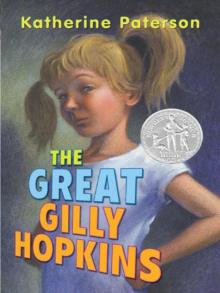 The Great Gilly Hopkins
The Great Gilly Hopkins Bridge to Terabithia
Bridge to Terabithia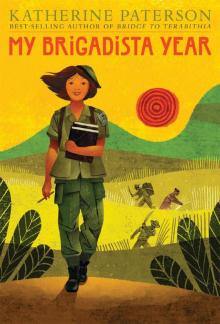 My Brigadista Year
My Brigadista Year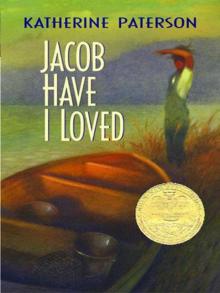 Jacob Have I Loved
Jacob Have I Loved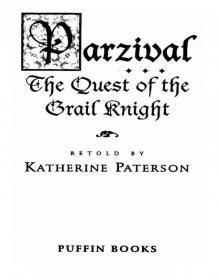 Parzival: The Quest of the Grail Knight
Parzival: The Quest of the Grail Knight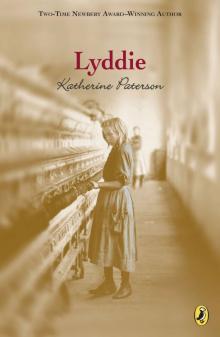 Lyddie
Lyddie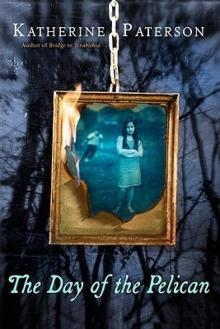 The Day of the Pelican
The Day of the Pelican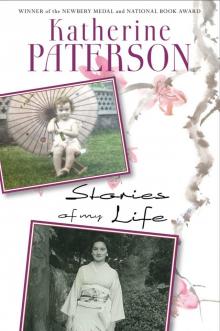 Stories of My Life
Stories of My Life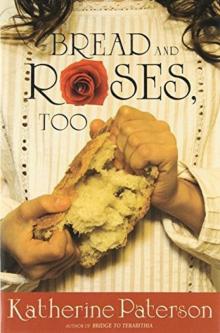 Bread and Roses, Too
Bread and Roses, Too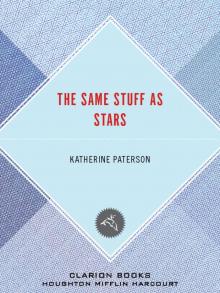 The Same Stuff as Stars
The Same Stuff as Stars